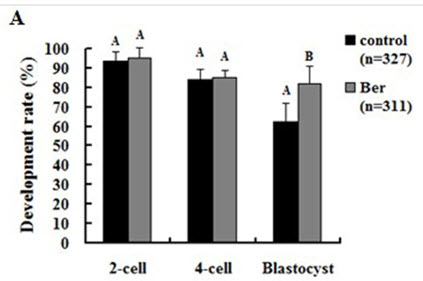An Unknown Way Berberine Could Help with IVF -- and PCOS!
Traditional Chinese medicinal herbs containing berberine have been historically used to prevent miscarriage.
If you have issues with infertility or miscarriage, could berberine extract help you to become pregnant and have a successful pregnancy, especially if you're considering "assisted reproduction"?
Free PCOS Newsletter
An interesting study from Harbin Medical University in China might shed some light on this question. They studied 150 infertile women with PCOS who were undergoing IVF (in-vitro fertilization). The women were divided into 3 groups: one group received berberine extract, another received metformin and the third group received a placebo tablet. Each group started their program 3 months before the IVF procedure.
Both the berberine and metformin groups had improvements in their testosterone and insulin levels, and had a higher pregnancy rate than the placebo group. Compared to metformin, the berberine group had greater weight reduction and achieved more live births with fewer side effects than metformin.
So why would this extract have such a beneficial effect? There are a number of mechanisms of action. But an interesting one is "MicroRNA".
Berberine Extract Helps PCOS at the Genetic Level
MicroRNA is a large family of small RNA molecules discovered in 1993 that regulate the behavior of at least 5,000 genes. (RNA, called ribonucleic acid, is present in all living cells.)
Recent research is showing that microRNA is involved in numerous physiological cellular processes, including regulation of ovarian function, maturation of eggs, ovarian follicle development, fetal growth, formation of the placenta, ovulation and much more. MicroRNA also regulates hormone production and action, such as progesterone and androgens (male hormones).
MicroRNA is also involved in various pathological processes, such as PCOS, ovarian cancer, diabetes, insulin resistance, and ovarian failure.
It's estimated that more than 200 microRNAs are involved in the development of an egg at the very earliest stages. One of the more important ones seems to be microRNA-21. It appears that berberine extract increases the expression of microRNA-21 in eggs or fluid surrounding eggs. This could at least partially explain why this extract appears to be helpful for maintaining growth of an egg at the very early stages.
The graph below shows the effect of berberine on early-stage mouse embryos. Notice that mice embryos exposed to berberine (the gray bars) were more likely to develop than those not exposed to it (black bars).

If you're curious about other benefits of berberine extract, click here.
In general, it appears that this extract works at a deep level to improve many aspects of PCOS, including improved chances of a pregnancy.
You can get lab-tested, highest quality berberine extract here.
Also see:
- Is It an "All-Purpose" Nutrient Hleping Solve Many Health Problems?
- It May Shrink Your Fat Cells
- Is It Safe?
Sources:
An Y et al. The use of berberine for women with polycystic ovary syndrome undergoing IVF treatment. Clin Endocrinol (Oxf). 2014 Mar;80(3):425-31.
Zhang C et al. The Anti-Apoptotic Role of Berberine in Preimplantation Embryo In Vitro Development through Regulation of miRNA-21. PLoS One. 2015 Jun 4;10(6):e0129527.
Li Y et al. MicroRNAs in ovarian function and disorders.J Ovarian Res. 2015 Aug 1;8:51.
Liu S et al. Altered microRNAs expression profiling in cumulus cells from patients with polycystic ovary syndrome. J Transl Med. 2015 Jul 22;13:238.
Carletti MZ et al. MicroRNA 21 blocks apoptosis in mouse periovulatory granulosa cells. Biol Reprod. 2010 Aug 1;83(2):286-95.
Get Answers to your Questions about
- Fertility
- Weight Control
- Hair Loss
- Stress
- Unwanted Hair
- Acne...and more!
FREE PCOS Report
and Newsletter

Your email is safe with us. We respect your privacy, and you may unsubscribe at any time.
Recent Articles
-
PCOS Long Journey to The Happy End
Apr 30, 18 07:24 PM
Hi Girls, Maybe my story will have one day a good end but I am not there yet. Until I was 31 years old I lived my dream, having lovely husband, good -
PCOS and Miscarriage
Apr 17, 18 04:03 PM
Proper diet and natural supplements can help the body maintain a pregnancy through successful delivery.
-
How to Deal with PCOS and Stress
Apr 04, 18 04:19 PM
Your body has a natural capacity to heal itself if you provide it with the necessary tools.





